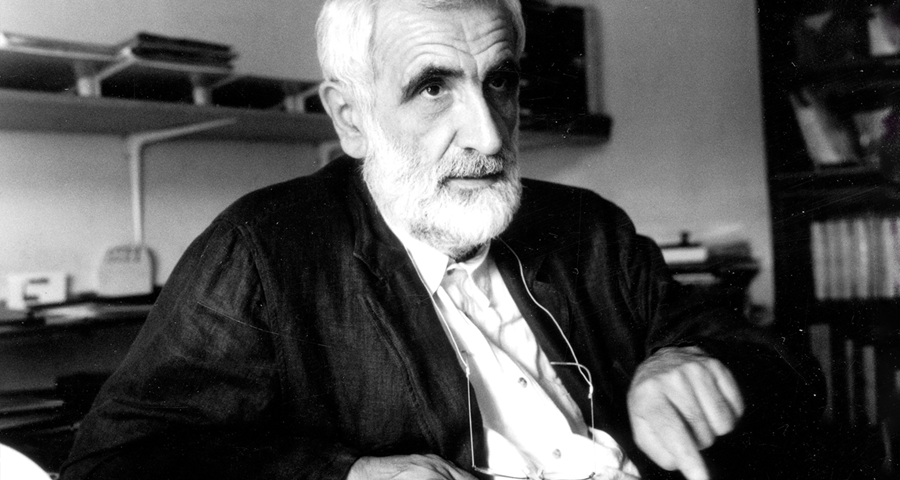Free Display First Floor
Grazie Enzo: Contemporary Responses to Enzo Mari
Enzo Mari was a pivotal figure in 20th century design and has had a major influence on many contemporary designers and their work. Accompanying the retrospective exhibition 'Enzo Mari Curated by Hans Ulrich Obrist with Francesca Giacomelli', this free display showcases the work of 14 London-based designers, studios and collectives whose practices share an affinity with Enzo Mari's.
What to expect
Sometimes a designer’s work is so influential that it inspires generations and continues to resonate beyond their lifetime. The Italian designer Enzo Mari (1932 – 2020) was one of the most significant designers of the 20th century, his work spanning disciplines such as art, graphics, product design and education.
Mari’s wide-ranging practice has been a reference point for many and this display features a selection of London-based designers and studios whose work shares an affinity with Mari’s. They have connected with Mari’s interest in challenging production processes, his attention to the simplification of form, his engagement with toys and games, and his desire to democratise design.
Inspired by our latest exhibition Enzo Mari curated by Hans Ulrich Obrist with Francesca Giacomelli, a retrospective spanning Mari’s 60-year career.
Share your visit with us using @designmuseum #EnzoMariBalcony

Images by Eva Herzog.















Designers

Enzo Mari
A Practice for Everyday Life
The graphic design studio A Practice for Everyday Life (APFEL) was set up by Kirsty Carter and Emma Thomas in 2003. They design graphics and publish a growing library of typefaces based on research and centred on the user.
Martino Gamper
Gamper’s work spanning furniture, interiors and books is playful, intuitive and resourceful. It centres around the necessity of creating something useful while also being imaginative.
Industrial Facility
The work of Sam Hecht and Kim Colin, founders of Industrial Facility, is characterised by a thoughtful consideration of form and a sensitive and well-researched approach to how objects are used day to day. It is what they call ‘a duty to ensure the project has not just commercial credibility but also usefulness, appropriateness and longevity'.
Rio Kobayashi
Born in Japan to a family of artisans, Kobayashi’s work approaches fine craftsmanship with a twist of light-heartedness. Often working in wood, he experiments with fabrication techniques and colours, blending elements of his cultural heritage to create objects that are sophisticated yet playful.
Livia Lauber
Lauber creates objects and pieces of furniture that contest traditional functions and production methods. She is interested in low-tech solutions and ways of simplifying the making process as well as the design of her finished pieces.
Michael Marriott
Marriott is an industrial designer often making things in small batches, and overseeing every stage of the design process. He is interested in making functional objects that are not led by fashion, marketing or fads.
Andu Masebo
Masebo began his career working with industrial fabricators and has continued to do so since setting up his own practice. From his background in making, he has a deep interest in manufacturing processes and the workings of the factory floor. He works closely with manufacturers and tries to find new uses for industrial machinery to push its limits.
Jasper Morrison
Morrison is known for the apparent simplicity of his designs. Uncomplicated and understated, his work questions what ‘good design’ is and he strives to create objects that are understated, useful and made responsibly.
Jaclyn Pappalardo
Pappalardo’s practise is informed by her background in set design. She has a particular interest in seating and looks at chairs as a study of the body and form itself, not just as functional objects. She likes to use unconventional techniques and works with repeating patterns with the aim of distilling the design’s final form.
RESOLVE Collective
RESOLVE is an interdisciplinary design collective founded by Akil Scarfe-Smith and Seth Scarfe-Smith that combines architecture, engineering, technology and art to address social challenges. Much of their work aims to provide platforms for the production of new knowledge. An integral part of their practise involves designing with and for young people and under-represented groups in society. They see design as more than its aesthetic value; it is also a mechanism for political and socio-economic change.
Sound Advice
Founded by Joseph Henry and Pooja Agrawal in 2020, Sound Advice is a platform dedicated to tackling inequality and racial discrimination in the architecture and the built environment industry. Fed up with the often academic discussions around inequality, they started by creating slickly designed slogan-like statements. These led to articles, podcasts and events that focus on inequality in London.
Special Projects
Founded by Clara Gaggero Westaway and Adrian Westaway, Special Projects are interested in using design to enhance peoples’ quality of life. The studio focuses on digital wellbeing and how technology can be humanised. They also advise technology companies on how to integrate wellbeing features into their software, aiming to help users find a balance between the analogue and digital.
Plan your visit
Visit information
This is a free display located at the museum's Level 1. It will be open until 26 January 2025, and no pre-booking is required.
Exhibition Design by Wolfe Hall. Background image by Studiomama.